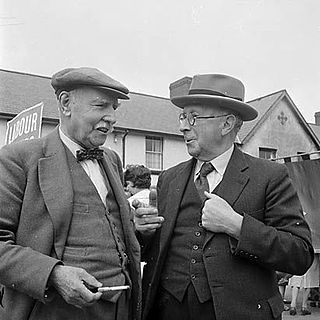Related Research Articles

Hedd Wyn was a Welsh-language poet who was killed on the first day of the Battle of Passchendaele during World War I. He was posthumously awarded the bard's chair at the 1917 National Eisteddfod. Evans, who had been awarded several chairs for his poetry, was inspired to take the bardic name Hedd Wyn from the way sunlight penetrated the mist in the Meirionnydd valleys.
Taliesin was an early Brittonic poet of Sub-Roman Britain whose work has possibly survived in a Middle Welsh manuscript, the Book of Taliesin. Taliesin was a renowned bard who is believed to have sung at the courts of at least three kings.

Anglo-Welsh literature and Welsh writing in English are terms used to describe works written in the English language by Welsh writers. It has been recognised as a distinctive entity only since the 20th century. The need for a separate identity for this kind of writing arose because of the parallel development of modern Welsh-language literature; as such it is perhaps the youngest branch of English-language literature in the British Isles.

William Williams, Pantycelyn, also known as William Williams, Williams Pantycelyn, and Pantycelyn, is generally seen as Wales's premier hymnist. He is also rated as one of the great literary figures of Wales, as a writer of poetry and prose. In religion he was among the leaders of the 18th-century Welsh Methodist revival, along with the evangelists Howell Harris and Daniel Rowland.
Medieval Welsh literature is the literature written in the Welsh language during the Middle Ages. This includes material starting from the 5th century AD, when Welsh was in the process of becoming distinct from Common Brittonic, and continuing to the works of the 16th century.
This article is about the particular significance of the year 1990 to Wales and its people.
This article is about the particular significance of the year 1975 to Wales and its people.
This article is about the particular significance of the year 1940 to Wales and its people.
This article is about the particular significance of the year 1924 to Wales and its people.
This article is about the particular significance of the year 1923 to Wales and its people.
This article is about the particular significance of the year 1916 to Wales and its people.
This article is about the particular significance of the year 1915 to Wales and its people.
This article is about the particular significance of the year 1852 to Wales and its people.
This article is about the particular significance of the year 1845 to Wales and its people.

Llanycrwys is a community located in Carmarthenshire, Wales. Situated in the historical Cayo Hundred in the Union of Lampeter, it is situated near the River Cothi, and is separated from the parish of Caio by the Afon Twrch, which flows near the St. Davids church. The church is isolated, and was restored in 1892 by C. H. Purday of Ewan Christian, who had a porch on the western side, with a timbered gable.

Thomas Evan Nicholas, who used the bardic name "Niclas y Glais", was a Welsh language poet, preacher, radical, and champion of the disadvantaged of society.

Daniel Evans, better known by his pseudonym, Daniel Ddu o Geredigion, was a Welsh language poet.
Robert Rhydwenfro Williams was a Welsh poet, novelist and Baptist minister. His work is mainly written in his native Welsh language, and is noted for adapting the established style and context of Welsh poetry from a rural and bygone age to that of a modern industrial landscape, while retaining traditional prosody and metre.
Steve Eaves is a Welsh poet, songwriter and singer, working in the Welsh language. He has lived for most of his life in the Bangor area of North Wales. He has been a performing musician for over 45 years. During the late 1960s and early 1970s he worked as a labourer and musician, with frequent forays to Chester, Crewe and other locations to perform at folk clubs and underground venues of the period. He also performed at the now legendary Les Cousins folk club in Soho, sharing the floor spot with legendary blues singer Jo Ann Kelly. He also performed with various 'underground' luminaries of the time such as Al Stewart, Tea and Symphony, and the Sutherland Brothers.

Welsh-language literature has been produced continuously since the emergence of Welsh from Brythonic as a distinct language in around the 5th century AD. The earliest Welsh literature was poetry, which was extremely intricate in form from its earliest known examples, a tradition sustained today. Poetry was followed by the first British prose literature in the 11th century. Welsh-language literature has repeatedly played a major part in the self-assertion of Wales and its people. It continues to be held in the highest regard, as evidenced by the size and enthusiasm of the audiences attending the annual National Eisteddfod of Wales, probably the largest amateur arts festival in Europe, which crowns the literary prize winners in a dignified ceremony.
References
- ↑ Modern Poetry in Translation. King's College London. 1995. p. 39.
- ↑ Donald Evans (1991). Rhydwen Williams. University of Wales Press. p. 83.
- ↑ National Museum of Wales: Some facts and figures regarding Gorsedd ceremonies. Accessed 7 January 2014
- ↑ University of Wales, Lampeter, since 2010, known as University of Wales Trinity St David UOA 56 - Celtic Studies: RA5a: Research environment and esteem.Accessed 7 January 2014